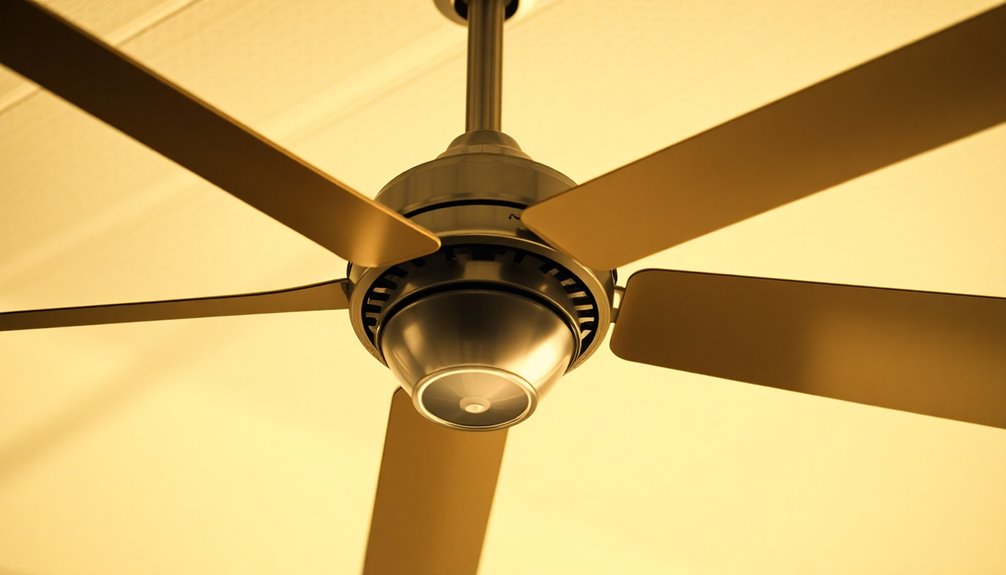If your ceiling fan hums, it often points to issues like loose connections or insufficient lubrication in the motor. You might have loose screws, causing vibrations that lead to that annoying sound. Dust accumulation on the blades can also disrupt balance, aggravating the problem. If you're using a dimmer switch not rated for fans, it may alter voltage and create noise. Regular inspections and maintenance can help reduce these hums. So, it's a good idea to check these factors and see how simple fixes can make a big difference in your fan's operation.
Key Takeaways
- Humming from a ceiling fan often indicates loose connections or lubrication issues in the motor.
- Insufficient lubrication on motor bearings can increase friction, leading to humming noises.
- Loose screws in the fan assembly can cause vibrations, resulting in a humming sound.
- Using improper dimmer switches can alter voltage delivery, contributing to humming noises.
- Dust accumulation on blades can disrupt balance and cause the fan to hum.
Types of Noises From Ceiling Fans

When it comes to ceiling fans, you might notice a range of noises that can indicate different issues. A humming ceiling fan often points to minor problems like loose connections or lubrication issues within the fan motor.
If you hear clicking sounds, it's usually due to the fan blades rubbing against the housing or loose blades and hardware. This can easily be fixed by tightening screws and making sure everything is secure.
Grinding noises can indicate unbalanced blades or failing motor bearings, which may require more attention.
Rattling sounds often suggest loose parts within the fan assembly, and addressing this swiftly can prevent more significant problems down the line.
Additionally, buzzing or humming may stem from faulty electrical dimmers or unbalanced blades that amplify vibrations.
Regular maintenance is essential, as it minimizes unwanted noises and guarantees your ceiling fan operates quietly.
By keeping an ear out for these sounds and addressing them promptly, you can prolong the life of your fan motor and maintain a peaceful environment in your home.
Common Causes of Humming

Humming noises from your ceiling fan can be annoying, but they usually point to specific issues that can be addressed. One common cause is loose screws. When screws that secure the fan blades or motor aren't tight, they can create vibrations that lead to a humming sound.
Another frequent culprit is insufficient lubrication of the motor bearings. If these bearings lack proper lubrication, friction builds up, causing a persistent humming as the fan operates.
Additionally, if you're using a dimmer switch not designed for fan speed control, it might alter the voltage delivery, often resulting in a humming noise when the fan's running.
Accumulation of dust and debris on the blades and motor can also disrupt the fan's balance, contributing to those irritating sounds.
Finally, if you have a remote-controlled fan, a malfunctioning remote receiver can cause electrical interference, making the fan hum when powered on.
Bad Wire Connectors

Bad wire connectors can be a hidden source of frustration in ceiling fans, often leading to those bothersome humming noises. These connectors can create loose or touching connections, which usually stem from poor installation or deterioration over time.
If there's any slack in the wires, it can cause wobbling and vibrations, further contributing to that annoying humming noise you hear.
To avoid this issue, it's vital to regularly inspect your wire connections. Look for any signs of looseness or damage, as catching these problems early can save you from bigger electrical headaches down the line.
Ensuring that wire connections are securely fastened and properly insulated will minimize the risk of humming sounds arising from electrical arcing or interference.
Additionally, always use connectors that are rated for the specific voltage and current of your ceiling fan. This step is essential to prevent overheating and the potential humming noise that can result from electrical issues.
Loose Screws

Loose screws in your ceiling fan can be just as problematic as faulty wire connectors, leading to vibrations that create those irritating humming noises.
Over time, the screws that hold the fan blades to the motor can loosen, compromising the stability of your fan. When this happens, the components may not be securely fastened, causing your fan to vibrate and produce a persistent fan hum.
To prevent this issue, regular maintenance is essential. Make it a habit to periodically inspect your ceiling fan and check for any loose screws.
When tightening them, you should feel some resistance, which indicates they're being secured properly. However, be cautious not to apply excessive force, as this can damage the components.
Addressing loose screws promptly not only enhances your fan's performance but also extends its lifespan.
By ensuring everything is tightened, you reduce the likelihood of operational noise, such as that annoying hum.
Poorly Lubricated Motor

If your ceiling fan is humming, a poorly lubricated motor might be the culprit.
Dust and grime can build up, causing friction and making the motor work harder than it should.
Regular maintenance, like cleaning and re-oiling, is essential for smooth operation and minimizing that annoying noise.
Causes of Poor Lubrication
When a ceiling fan motor isn't properly lubricated, it can lead to significant issues, including an annoying humming noise. One of the primary causes of poor lubrication is insufficient maintenance. Over time, dust and grime can build up, obstructing lubrication pathways and increasing friction between the moving parts.
This friction is a major contributor to the humming sound your ceiling fan is making.
Another factor might be the age of your ceiling fan. As motors age, they may develop wear and tear that can hinder proper lubrication. If you're dealing with a faulty motor, it's vital to address the lubrication needs promptly.
Otherwise, the humming could become a persistent issue that detracts from the fan's performance.
Additionally, using the wrong type of lubricant can lead to further complications. It's important to use products specifically designed for ceiling fan motors to guarantee peak function.
If you notice that humming continues even after you've lubricated the motor, it may indicate deeper issues that need professional evaluation.
Regular maintenance is key to preventing these problems and guaranteeing your ceiling fan runs smoothly.
Maintenance and Solutions
Maintaining your ceiling fan is essential for preventing issues like humming from a poorly lubricated motor. A fan motor requires regular cleaning and re-oiling of the bearings to operate smoothly. When lubrication is insufficient, friction increases, leading to those annoying humming noises as the motor struggles to function.
To keep your fan motor in top shape, establish a routine maintenance schedule. Start by dusting and cleaning around the motor to prevent grime buildup, which can worsen lubrication issues. Once that's done, apply a few drops of appropriate lubricant to the motor bearings. This simple step can drastically reduce friction and noise. Regular maintenance can also help to prevent dangerous situations like mechanical failure that contribute to humming sounds.
Don't ignore any humming sounds you notice. Monitoring your fan's performance and addressing lubrication needs promptly can minimize or eliminate these noises.
Faulty Electrical Dimmers

Have you ever wondered why your ceiling fan hums annoyingly, especially at lower speeds? One common culprit could be your dimmer switches. If you're using standard dimmer switches not designed for fan speed control, you might be introducing voltage changes that affect your fan's motor performance.
This humming noise tends to be more pronounced in quiet environments, particularly at night when you're trying to relax.
Many dimmer switches simply aren't compatible with ceiling fans. They can cause that irritating hum, making your peaceful atmosphere less enjoyable.
To eliminate this issue, consider replacing your current dimmer switch with a fan speed control switch. These specialized switches use solid-state technology to minimize noise, guaranteeing smoother operation.
It's crucial to consult the manufacturer guidelines for your ceiling fan when choosing electrical components. This way, you can verify that the dimmer switches or controls you select are appropriate for your specific fan model.
Weak Remote Receivers

Dimmer switches aren't the only factor that can contribute to that annoying hum from your ceiling fan; weak remote receivers can also be a significant source of noise.
When the remote receiver struggles to communicate effectively, it can lead to humming noises that disrupt your peace. Here are a few common causes of weak remote receivers:
- Poor Signal Transmission: If there are obstructions between the remote and the receiver, the signal may weaken, causing the fan to emit humming noises.
- Low Batteries: When the batteries in your remote are low, the signal sent to the ceiling fan can become inconsistent, resulting in unwanted noise.
- Electrical Interference: Other electronic devices may interfere with the signal, further reducing the receiver's performance.
To troubleshoot, try connecting the fan directly to a power source. If the humming stops, your remote receiver is likely at fault.
Regular maintenance and checks on your remote can help prevent future issues. If humming persists, consider replacing the remote or receiver unit to restore a quiet operation.
Solutions for Humming Fans

If your ceiling fan is humming, start by checking for loose connections and tightening any screws that may have come undone.
Next, make sure the motor is properly lubricated to reduce friction and noise.
Addressing these issues can greatly reduce that annoying hum and improve your fan's performance.
Tighten Loose Connections
While loose connections in your ceiling fan might seem like a minor issue, they can lead to annoying humming noises that disrupt your comfort.
It's crucial to tackle this problem promptly to maintain a peaceful environment. Start by inspecting your ceiling fan for any loose connections that could be causing vibrations.
Here's what you should do:
- Check the mounting bracket: Verify it's securely fastened to the ceiling. A loose bracket can create significant noise.
- Inspect blade attachment screws: Tighten these screws carefully to minimize vibrations. They should create resistance without excessive force; if they're worn out, consider replacing them.
- Secure wire connections: Open the junction box and make sure all wire connections are tight. Loose wires can lead to electrical noise that contributes to the humming sound.
Regular maintenance, including tightening loose connections, not only helps eliminate noise but also extends your ceiling fan's lifespan.
Lubricate Motor Properly
A well-lubricated motor is essential for keeping your ceiling fan running quietly and efficiently. Insufficient lubrication can increase friction, causing that annoying humming noise during operation. To prevent this, make it a habit to regularly clean and lubricate your fan's motor.
Here's a quick guide to help you:
| Step | Action | Tips |
|---|---|---|
| 1. Disconnect Power | Turn off the fan and unplug it. | Safety first! |
| 2. Remove Housing | Carefully take off the motor housing cover. | Keep screws in a safe place. |
| 3. Apply Lubricant | Use lightweight oil (like 3-in-1 oil) on bearings, avoiding over-lubrication. | A few drops go a long way! |
When to Seek Professional Help

Ceiling fan hum can be more than just an annoying sound; it often signals underlying problems that need attention.
If your ceiling fan continues to hum persistently despite regular maintenance, it's time to assess seeking help from a professional electrician.
Here are three key indicators that signal when to call for assistance:
- Electrical Issues: If you notice flickering lights or frequent circuit breaker trips linked to the fan, these could be signs of electrical problems that require urgent evaluation.
- Unusual Smells or Overheating: Any strange odors or overheating components, especially from the fan motor, necessitate immediate professional inspection to prevent potential fire hazards.
- Balancing and Adjustment Trouble: Difficulty in balancing the fan or adjusting its settings, particularly if self-adjustments fail, indicates that you may need expert intervention to guarantee safe and effective operation. Additionally, addressing these issues is crucial for maintaining energy-efficient systems in your home.
Frequently Asked Questions
How Do I Stop My Ceiling Fan From Humming?
To stop your ceiling fan from humming, first, check that all screws and connections are tight. Loose components can vibrate and create noise.
Next, clean the fan blades and motor to remove dust buildup. Lubricate the motor bearings with the right oil to reduce friction.
If the humming continues, consider replacing any faulty dimmers with compatible speed controls, and test the remote receiver or capacitor for malfunctions.
Regular maintenance can help keep your fan quiet.
Do Most Ceiling Fans Hum?
Yes, most ceiling fans do hum, especially if they're not functioning efficiently.
You might notice this noise more when the fan's set to lower speeds or if it's using an incompatible dimmer switch.
The hum can stem from various issues, like loose wires or unbalanced blades.
Keeping up with regular maintenance, like tightening connections and lubricating parts, can help reduce or even eliminate that humming sound in your fan.
Why Is My Ceiling Fan Motor Making Noise?
If your ceiling fan motor's making noise, it could be due to several factors. You might've loose connections or insufficient lubrication in the motor, causing friction.
Check for debris that could be affecting performance, too. If you've got a dimmer switch, it may not be compatible with your fan's speed control, leading to voltage changes.
Regular maintenance, like tightening screws and inspecting connections, can help reduce noise and keep your fan running smoothly.
Will a Bad Capacitor Make a Ceiling Fan Hum?
Imagine your ceiling fan as a symphony, where a bad capacitor plays the wrong notes, causing a persistent hum.
Yes, a faulty capacitor can definitely make your ceiling fan hum. It disrupts the electrical current, leaving your fan struggling to perform.
When it malfunctions, it can lead to inconsistent speeds or prevent it from starting altogether.
Testing the capacitor with a multimeter can reveal if it's the culprit, allowing you to restore harmony.
Conclusion
So, if your ceiling fan's humming like a thousand angry bees trapped in a jar, don't panic! You've got the power to silence that buzzing menace! Tackle loose screws, bad wire connectors, and a needy motor with a bit of TLC. But remember, if the hum turns into a full-blown symphony of chaos, it might be time to call in the pros. You deserve a peaceful haven, not a concert hall in your living room!








